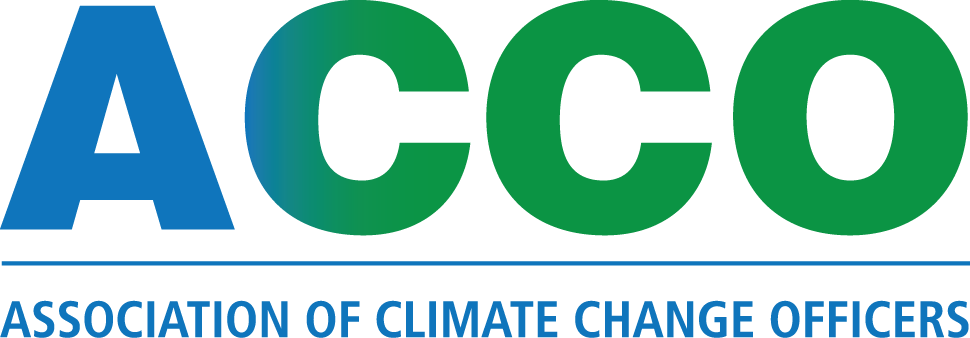Meeting Your CC-P® Elective Requirements
Elective Guidelines (description updated 2021)
In addition to passing the 4 above-referenced exams, applicants will need to take 14 hours of elective training in order to earn the Certified Climate Change Professional® (CC-P®) credential.
All elective courses must have a clear set of climate change related learning objectives that relate to:
The Core Competencies for Climate Change Officers and Professionals, and
ACCO’s mission and vision (see mission and vision statements on right-hand side of this page).
These electives cannot be redundant to subject matter and competencies covered in the 4 CC-P® exams. All electives must be oriented toward executive or professional development (e.g. undergraduate/graduate courses, conference plenary sessions and site visits/tours may not be applied toward elective requirements).
Satisfying the Elective Requirements
Applicants must satisfy the following elective category requirements, which are evaluated based upon the nature of the applicant’s current and future work:
3.5 hours oriented toward your geographic region or region type (e.g. coastal community, high altitude, desert),
3.5 hours oriented toward your employer's sector and
3.5 hours toward your occupation or professional responsibilities.
If such training does not exist or is not reasonably accessible, ACCO will waive the category requirement -- though applicants will still need to satisfy the overall 14 hour requirement.
Electives can be taken at any time (e.g. before, during or after exams). However, applicants may only use electives taken within 1 year of the date of submission of the final CC-P® application.
More About the Elective Category Requirements
All electives meeting category requirements must be climate-related (e.g. climate change, resilience, adaptation, disaster preparedness, GHG management, clean energy, energy efficiency) AND have an orientation toward the category as described below:
Sector-specific electives: Applicants should identify education/training activities oriented toward the economic or infrastructure sector of their employer.
Geographic region or location type: Applicants should identify education/training activities oriented toward the specific location (e.g. city, state/province, region) OR region type (e.g. coastal, rural, urban) in which he/she works (this requirement can also be used for other locations in which applicant is responsible)
Professional role or occupation: Applicants should identify education/training activities oriented toward the competencies and functions required of their role or occupation. Applicants should consider their day-to-day responsibilities, job descriptions and expectations of their employer when selecting electives for this category.
Applicants whose work is oriented toward providing services for third-party organizations (e.g. consultants, non-profit) may also use electives that are oriented toward their clients. However, applicant will be required to document that particular client work on their resume as part of the CC-P® application package.
Some education/training activities can satisfy multiple categories, depending upon the applicant’s employer, region/location and responsibilities.
Where to go for Elective Courses
Taking coursework through ACCO: ACCO offers a robust suite of training modules through live online and on-demand programming and in-person training programs. Course content and programs that have NOT been identified as recommended prep materials for exams can be leveraged to meet elective requirements.
Satisfying electives through ACCO Accredited Providers and Events: ACCO will be designating a group of events and organizations as accredited providers. Course offerings and training activities that meet the above-referenced elective requirements are eligible for satisfying the elective requirements.
Satisfying electives through other third-party providers: Candidates are welcome to satisfy elective requirements through third-party institutions, though will be required to provide sufficient documentation reflecting provider, venue, date, content and instructors. ACCO reserves the right to decline any training that does not meet its guidelines for relevance and rigor. Consult the Preparing Your Application page for more information. Note that training organized, administered or provided by your employer may not be used for elective requirements.
Documenting Your Electives
Courses satisfying elective requirements must be structured learning activities (e.g. executive education, workshops, conference breakout sessions with a clearly described objective). Undergraduate and graduate courses, tours, site visits, keynote speakers and interviews may not be used toward electives. Learning activities used toward electives may not be self-study or self-taught.
All electives must take place within 12 months of the date of your application.
Any training that has not been pre-approved by ACCO (i.e. ACCO courses, training by ACCO accredited providers) must be accompanied by sufficient documentation (e.g. description, agenda/syllabus) enabling ACCO to approve usage as an elective. If that documentation is not available, please use the Elective Validation form to provide that information.
> Note: Beginning October 1, 2020, applicants using ACCO on-demand videos to satisfy elective requirements will be required to submit an elective validation form.You will need to provide ONE of the following means of validating your participation in the training activity:
> Registration confirmation
> Copy of a sign-in sheet
> ACCO Elective Validation form (attached)
Related Resources
Aligning Electives with
ACCO’s Mission & Vision
Our Mission
ACCO defines, develops and supports the functions, resources and communities necessary for effective organizational leadership in addressing climate-related risks and opportunities.
Our Vision
ACCO enables all organizations to be more sustainable by building enterprise capacity and empowering leadership to respond to climate change.
